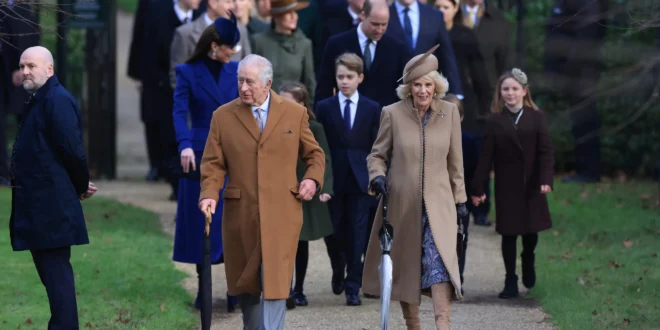Britain’s ‘unwritten’ constitution is unusually clear on the political arrangements if a monarch is too sick to work.
Britain’s ‘unwritten’ constitution is unusually clear on the political arrangements if a monarch is too sick to work.
What does Britain do if the king is too sick to work? Could Prince Harry end up as king in his place? POLITICO’s constitutional expert — who asks not to be named for these articles — explains all.
LONDON — Unusually for Britain’s “unwritten” constitution, the arrangements for a sickly monarch can be found via a simple Google search.
A formal plan is set out in the Regency Act 1937, an act of parliament which covers four potential scenarios: a monarch succeeding to the throne before the age of 18; a monarch becoming permanently incapacitated; temporarily incapacitated; or simply being absent from “the realm” (i.e. abroad).
For the first two scenarios, a “regent” would be created, to operate as monarch in all but name. For the latter two, counsellors of state — constitutional deputies — are appointed to act on the king’s behalf.
During the king’s recent prostate operation, and again with Monday’s announcement of his cancer diagnosis, the palace made clear Charles has no intention of appointing counsellors to carry out his duties while he recovers. (These would usually be his eldest son Prince William, his sister Princess Anne or his brother Prince Edward.)
As with his late mother, Charles seems to have a serious aversion to wheeling out the relatives during a bout of ill health. Queen Elizabeth II used counsellors just once on that basis — when Charles, then the Prince of Wales, and William opened parliament on her behalf in May 2022.
Foreign jaunts are another matter, however.
The late queen’s love of globetrotting meant counsellors of state, usually her mother Elizabeth and sister Princess Margaret, were often found providing royal assent to acts of parliament — the process by which a monarch signs off new laws — or, occasionally, even declaring a state of emergency. Charles himself appointed counsellors of state last year during trips to Germany and Romania.
Power grab
Although a British monarch has little political power, they do carry out a myriad of constitutional duties, including giving their signature or verbal assent to legal documents at meetings of a shadowy advisory body known as the Privy Council.
Counsellors of state can conduct most of the same duties, but with two exceptions. They may not dissolve parliament or appoint new members of the House of Lords — both acts being prohibited by law, lest a counsellor go rogue. (They could, theoretically, appoint a new prime minister.)
If, however, a monarch loses the ability to hold a pen, or to speak clearly, then it’s clearly time for a regency.
In the final weeks of his life, George V — Charles’ great-grandfather — was this incapable. At one point, the king’s doctor even helped guide his hand to scrawl ‘GR’ (Georgius Rex) on a state document. Understandably appalled, his son King George VI later asked the government to make more dignified arrangements. The Regency Act 1937 was thus born.

A monarch cannot initiate a regency themselves, however — the whole point being they are incapable of doing so. Instead, five supposed bastions of the British establishment (including the monarch’s spouse and the speaker of the House of Commons) “declare” the monarch to be incapacitated.
At that point, the next in line to the throne — in this case Prince William — would formally become regent. As with counsellors of state, the regent can do almost anything the incapacitated monarch can no longer do, except grant royal assent to legislation which alters the line of succession.
It has not always been so neat and tidy. In 1788 King George III — famous for losing the American colonies — suffered his first bout of “madness,” and was incapable of providing assent to legislation providing for a regent. Parliament approved the new laws anyway — arguably an unconstitutional act.
In sickness and in health
King Charles is not the first British monarch to have been diagnosed with cancer during his reign. But he does at least have the luxury of being in possession of all the facts of his condition.
In September 1951, doctors didn’t even tell George VI — Charles’ grandfather — that he was suffering from cancer of the lung. Instead, they told him a “blockage” meant one had to be removed. The public were told even less, with one health bulletin referring obliquely to “structural changes” in the king’s vital organs.
George VI was operated on at Buckingham Palace, and the surgery was, relatively speaking, a success. Only three days later did a very weak king appoint counsellors of state. A few months later, he was dead, killed by coronary thrombosis. He was only 56.
The then-prime minister, Clement Attlee, had called a snap general election as the king recovered from his operation. But helpfully, the British constitution has long made provisions for a monarch dying after parliament has been dissolved, but before a general election.
In such a scenario — and remember, a general election is due later this year — then polling day is postponed by a fortnight, a period which can be extended or shortened by up to seven days. This would allow for all the necessary ceremonial duties surrounding the death of a monarch (a process with which we’re all now familiar) without losing any campaign days.
There is another option for a sickly monarch which isn’t covered by legislation: abdication. But during the long reign of Queen Elizabeth II this was regarded at the palace as a dirty word — and given Charles has “solemnly” pledged to reign “throughout the remaining time god grants me,” it seems unlikely he’ll follow the lead of his great uncle King Edward VIII and voluntarily surrender the throne.
According to the journalist Robert Hardman’s recent book on the king, Charles disliked any talk of establishing a regency while his mother was still alive. And while the 1937 Act was intended to cover every eventuality, in that respect it failed. In 1953 it was amended so that Prince Philip, the queen’s husband, would have served as regent rather than the queen’s sister, Princess Margaret, in the event of his wife’s death. This was deemed fair given he was father to the heir to the throne.
Arise, King Harry?
Looking ahead, another, more uncomfortable scenario might yet arise.
If Prince William were to become king in the next few years, then the eligible regent in the event of his own demise would not be his son, Prince George, who will not turn 18 until 2031, but his semi-estranged brother Prince Harry, who is currently crossing the Atlantic from California to see his father for the first time in almost a year.

Given everything that has happened, might we yet see parliament legislate to make William’s wife Kate, the Princess of Wales, the prospective regent in Harry’s place?
But let’s not get ahead of ourselves.
Although a cancer diagnosis for any 75-year-old is a serious business, it is not the end of the world. In the late 18th century, the apparently “mad” King George III recovered, and the intended regency never actually took effect.
King Charles III could reign for another 20 years or more.
And in the meantime, the ancient British constitution will, as one historian famously put it, keep on “muddling through.”
 Geostrategic Media Political Commentary, Analysis, Security, Defense
Geostrategic Media Political Commentary, Analysis, Security, Defense





